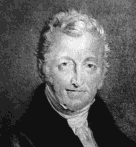 Thomas Robert Malthus
Thomas Robert Malthus
February 13, 1766 - December 29, 1834
|
Rev. T.R. Malthus, a Professor of History and Political Economy in the East India College,
Hertfordshire London.
English economist and demographer, best known for his theory that population growth will always tend to outrun
the food supply and that betterment of the lot of mankind is impossible without stern limits on reproduction.
Malthus was of a prosperous family. His father, a personal friend of the philosopher and skeptic David Hume,
was an ardent disciple of Jean-Jacques Rousseau, whose book ?mile may have been the source of the elder
Malthus' liberal ideas about educating his son.
The young Malthus was educated largely at home until his admission
to Jesus College, Cambridge, in 1784. There he studied a wide range of subjects and took prizes in Latin and Greek,
graduating in 1788. He took his master of arts degree in 1791, was elected a fellow of Jesus College in 1793,
and took holy orders in 1797. He wrote a pamphlet in 1796 called “The Crisis” (not published), which, among
other things, took a favourable view of newly proposed poor laws, which were to set up workhouses for the poor.
This was a view that ran somewhat counter to his views on poverty and population published two years later.
|
Other Published Works of Thomas Robert Malthus
|
1. The Grounds of an Opinion on the Policy of Restricting the Importation of Foreign Corn, Intended as an Appendix to "Observations on the Corn Laws" (London, John Murray, 1815).
2. Statements Respecting the East-India College, with an Appeal to Facts, in Refutation of the Charges Lately Brought Against it in the Court of Proprietors (London, John Murray, 1817).
3. Additions to the Fourth and Former Editions of an Essay on the Principle of Population, etc. (London, John Murray, 1817; Georgetown, C. Cruikshank, 1831).
4. The Principles of Political Economy Considered with a View to their Practical Application (London, John Murray, 1820; Boston, Wells & Lilly, 1821; revised and enlarged edition, London, William Pickering, 1836).
5. The Measure of Value Stated and Illustrated, with an Application of it to the Alterations in the Value of the English Currency since 1790 (London, John Murray, 1823).
6. Definitions in Political Economy, Preceded by an Inquiry into the Rules which Ought to Guide Political Economists in the Definition and Use of their Terms; with Remarks on the Derivation from these Rules in their Writings (London, John Murray, 1827).
7. The Travel Diaries of Thomas Robert Malthus, edited by Patricia James (Cambridge, Cambridge University Press, 1966).
8. Five Papers on Political Economy, T.R. Malthus, edited by C. Renwick (Sydney; University of Sydney, 1953).
9. Occasional Papers of T.R. Malthus: On Ireland, Population, Written Anonymously and Hiterto Uncollected, edited by Bernard Semmel (New York, Burt Franklin, 1963).
10. The Pamphlets of Thomas Robert Malthus (New York, Augustus M. Kelley, 1970).
11. The Works of Thomas Robert Malthus, 8 volumes, edited by E.A. Wrigley and David Souden, (London, Pickering & Chatto, 1986).
12. T.R. Malthus, Principles of Political Economy: Variorum Edition, 2 volumes, edited by John Pullen (Cambridge, Cambridge University Press, 1989).
13. "Population" in Supplement to Fourth, Fifth and Sixth Edition of the Encyclopedia Britannica, 6 volumes, edited by M. Napier (London, Hurst Robinson, 1824), pp. 306-333; republished in abridged form as A Summary View of the Principle of Population (London, John Murray, 1830).
|
|
